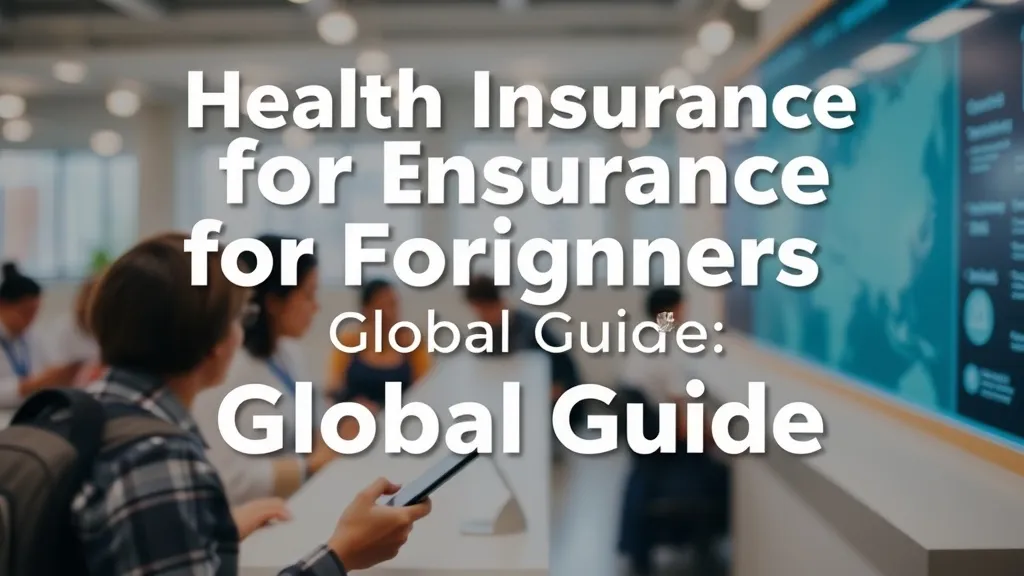Health Insurance for Foreigners: Global Guide
Agree: You’ve probably heard horror stories about sky-high medical bills abroad. Promise: In this guide, you’ll learn exactly how to secure health insurance for foreigners, satisfy visa rules, and avoid surprise expenses. Preview: We’ll cover what it is, why it matters, how to get covered, country case studies, common pitfalls, advanced tips, and future trends.
Did you know that 72% of expats report unexpected healthcare costs within their first year abroad? (Global Citizen Solutions) And it’s not just a travel headache.
Let’s dive in.
Table of Contents
- What Is Health Insurance for Foreigners?
- Why You Need Health Insurance for Foreigners
- How to Obtain Health Insurance for Foreigners
- Health Insurance for Foreigners by Country: Case Studies
- Switzerland
- Netherlands
- Portugal
- Common Mistakes to Avoid
- Advanced Tips & Future Trends
- FAQ: Health Insurance for Foreigners
- Conclusion
What Is Health Insurance for Foreigners?
Hook: Imagine getting urgent care in a country where you don’t speak the language. Context: Health insurance for foreigners bridges that gap. Detailed Explanation: It’s a specialized plan designed to cover non-citizens who live, work, study or travel abroad. These policies range from basic travel health riders to comprehensive expat medical plans with inpatient, outpatient, dental, and telemedicine benefits. Real Example: A British digital nomad in Bali uses telemedicine through his GeoBlue Xplorer plan when he sprains his ankle—no in-person clinic visit required. Expert Quote: “Customizable plans are the new standard,” notes Dr. Elena Rossi of the International Expat Health Forum. Actionable Takeaway: First, list your travel or residency itinerary. Then compare Health Insurance for Foreigners: Global Guide options that match your stay duration and activities.
Why You Need Health Insurance for Foreigners
Hook: You might be wondering, “Can’t I just pay out of pocket?” Context: The truth is most healthcare systems abroad aren’t cheap. In other words, medical bills can exceed your annual rent in a flash. Detailed Explanation: Benefits include visa compliance, major medical coverage, emergency evacuation, and repatriation. Countries like Switzerland mandate private insurance under law, with premiums of CHF 250–400/month and state subsidies available for low-income residents (Wikipedia). Example: A Canadian student in the Netherlands avoided a €5,000 hospital bill thanks to mandatory private coverage (~€120/month). Actionable Takeaway: Check local visa health requirements first—most visas demand proof within 30–90 days of arrival.
How to Obtain Health Insurance for Foreigners
Hook: Securing your plan is simpler than you think. Context: The steps vary by provider and country, but the core process remains similar.
1. Research & Compare: Use online portals to filter by coverage, price, network size, and telemedicine services.
2. Gather Documents: Passport copy, visa/residence permit, proof of address.
3. Complete Application: Online or through a broker.
4. Underwriting & Approval: Some plans approve instantly; others require a health questionnaire.
5. Policy Activation: Print digital certificate to present at visa interview or upon arrival.
“Digital claims processing is a game changer for expats,” says Maria Chen, Global Health Director at Cigna Global.
Real Example: Jorge from Mexico applied for IMG Global Medical Insurance and received approval within 24 hours—policy active on arrival in Spain. Actionable Takeaway: Don’t wait until you land; apply at least two weeks beforehand to catch any underwriting delays.
Health Insurance for Foreigners by Country: Case Studies
Hook: Rules can be as different as cheese in Switzerland vs. tapas in Spain. Context: We’ll spotlight three popular expat destinations.
Switzerland
Mandatory private coverage within three months of arrival. Premiums CHF 250–400/month. Subsidies for low earners. High quality, low wait times. Action: Compare local insurers via brokers.
Netherlands
Residents must purchase basic policy (~€120/month). Excellent expat satisfaction, top-10 global ranking. Telemedicine widely included. Keep proof for municipal registration.
Portugal
Public SNS healthcare accessible after visa registration (Golden Visa, D7). Private plans (e.g., IMG Europe) recommended for faster care and English-speaking doctors. Private insurance mandatory before Golden Visa issuance.
Common Mistakes to Avoid
Hook: Even savvy travelers slip up here. Context: Avoid these pitfalls.
- Buying travel insurance instead of expat health insurance (insufficient for long stays).
- Ignoring pre-existing condition clauses.
- Overlooking country-specific riders (e.g., maternity, sports activities).
- Waiting until last minute—underwriting delays happen.
Advanced Tips & Future Trends
Hook: Stay ahead of the curve. Context: The industry is evolving fast.
Telemedicine Integration: More insurers now include video visits and digital prescriptions. Customizable Plans: Retiree, family, digital-nomad modules let you pay only for what you use. Digital Claims Processing: Mobile apps streamline reimbursements, often within 48 hours.
Future Trends: Expect AI-powered health monitoring add-ons and blockchain verification of medical records. Providers will compete on convenience, not just cost.
FAQ: Health Insurance for Foreigners
A1: Costs vary by country, age, and coverage. Generally, basic European plans start at €80–100/month. Always compare quotes.
Q2: Do I need health insurance for short trips?
A2: Yes. Even travel health insurance must cover emergencies, repatriation, and COVID-related care. Some Schengen visas require minimum €30,000 coverage.
Q3: Can pre-existing conditions be covered?
A3: Some insurers offer riders for stable conditions after additional underwriting and premium loading. Check policy terms carefully.
Conclusion
Simply put, health insurance for foreigners is non-negotiable. We’ve defined what it is, explained why it matters, and walked through how to secure the right plan. You’ve seen real case studies from Switzerland, the Netherlands, and Portugal, and learned the common mistakes to avoid. Next steps:
- Review your visa’s health insurance requirements.
- Compare at least three international plans.
- Apply 2–4 weeks before departure to allow for underwriting.
The bottom line is that planning ahead saves you stress—and money. Secure your health insurance for foreigners today, and travel or live abroad with confidence.





